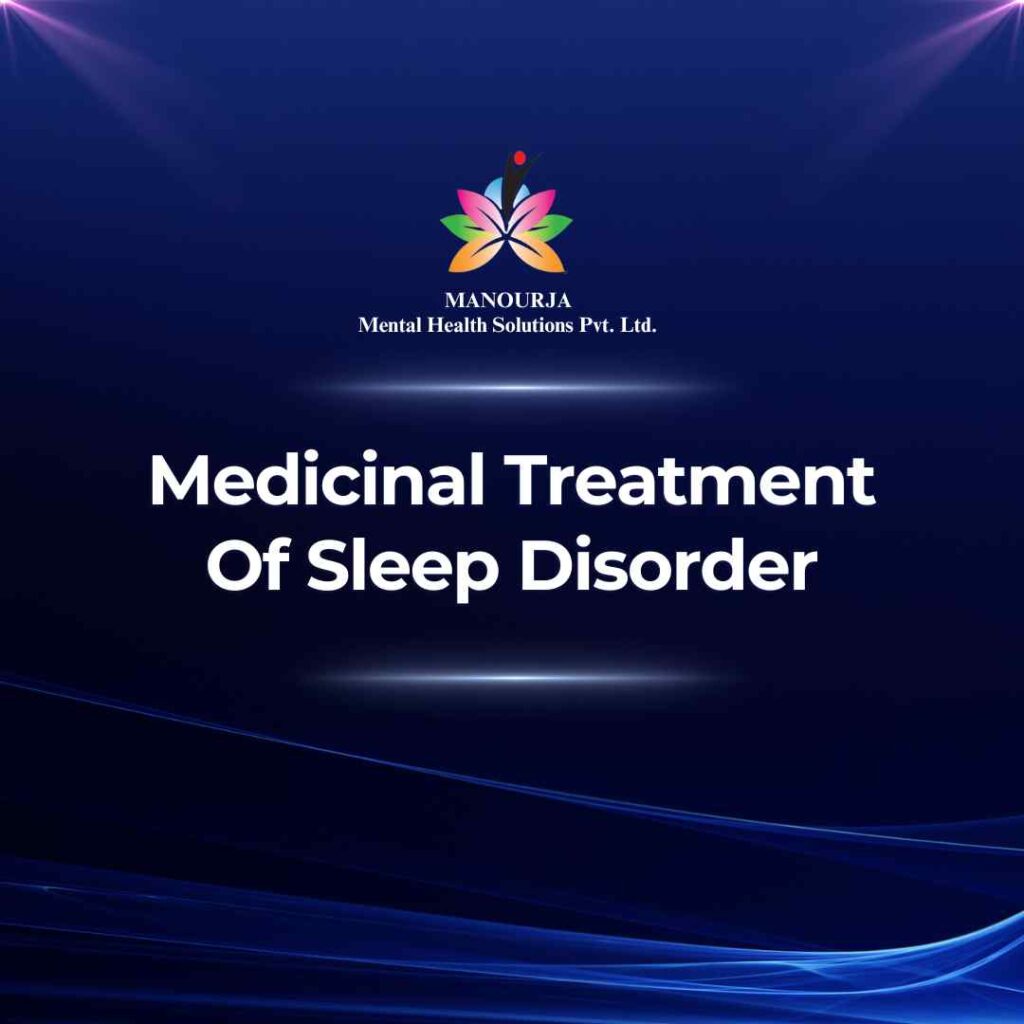Medicinal Treatment of Sleep Disorder

The treatment of sleep disorders often involves medicinal approaches, which can vary widely depending on the type of disorder and its severity.
Here is an overview of common medicinal treatments used for various sleep disorders:
- Sleeping Pills (Hypnotics): For short-term management of insomnia, doctors may prescribe sleeping pills. These medications help patients fall asleep or stay asleep. Examples include zolpidem (Ambien), eszopiclone (Lunesta), and temazepam (Restoril). These are usually prescribed for short periods due to risks of dependence and tolerance.
- Benzodiazepines: These drugs, which include lorazepam (Ativan), diazepam (Valium), and clonazepam (Klonopin), have sedative properties and are sometimes used for treating sleep disorders. They are effective but can lead to dependency and withdrawal symptoms, so they are typically prescribed only for severe cases and for short-term use.
- Antidepressants: Some antidepressants can help manage insomnia even when depression isn’t present. Particularly, tricyclic antidepressants like amitriptyline and doxepin are used to treat sleep issues due to their sedative effects. Newer antidepressants, such as trazodone, are also commonly prescribed for their sleep-inducing effects.
- Melatonin Receptor Agonists: These medications, like ramelteon (Rozerem), mimic the sleep-regulating hormone melatonin. They are used primarily to treat insomnia characterized by difficulty falling asleep.
- Orexin Receptor Antagonists: This class of medication, including suvorexant (Belsomra), targets the brain’s wakefulness mechanism, which can help to counteract insomnia.
- Stimulants: For disorders like narcolepsy that involve excessive daytime sleepiness, stimulants such as modafinil (Provigil) and armodafinil (Nuvigil) are prescribed to promote wakefulness during the day.
- CPAP (Continuous Positive Airway Pressure): Though not a medication, CPAP therapy is a cornerstone treatment for obstructive sleep apnea. It involves wearing a mask during sleep that keeps the airway open with a flow of air, thereby preventing breathing interruptions.
- Alpha-2 Delta Ligands: Gabapentin (Neurontin) and pregabalin (Lyrica) are used off-label for treating insomnia related to restless legs syndrome (RLS) and other sleep disturbances. They work by modulating neurotransmitter activity to reduce nerve pain and can improve sleep quality.
- Antihistamines: Over-the-counter sleep aids often contain antihistamines, such as diphenhydramine (Benadryl) and doxylamine. While they can help with occasional sleeplessness, they are not recommended for long-term use due to potential side effects like daytime drowsiness, cognitive impairment, and tolerance.
- Herbal Supplements: Some people opt for herbal treatments such as valerian root, chamomile, or lavender. However, the effectiveness and safety of these supplements can vary, and they are not regulated by the FDA with the same rigor as prescription medications.
It’s crucial for individuals with sleep disorders to consult healthcare providers to determine the most appropriate treatment. A tailored approach that may include a combination of medicinal treatments, lifestyle changes, and behavioral therapy tends to yield the best outcomes. Furthermore, monitoring and adjustments by a healthcare professional can help manage potential side effects and ensure effective management of the sleep disorder.
At MANOURJA, we believe in the transformative power of counseling. Our experienced therapists offer a safe and supportive space where you can explore your thoughts, emotions, and challenges. Through personalized counselling sessions, we’ll work together to develop coping strategies, build resilience, and achieve lasting positive change. Discover the path to a healthier, happier you with MANOURJA counselling services.
MANOURJA Rehabilitation Services
At MANOURJA, we’re dedicated to helping you in rebuild your life, after difficult times. Our rehabilitation services focus on understanding what you need to move forward, whether you’re recovering from addiction, trauma, or any psychological – social challenges. We create personalized plans, that are all about helping you, regain your strength and find hope again. With a caring team by your side, you’ll have the support to make real progress and take steps toward a brighter, healthier future.
